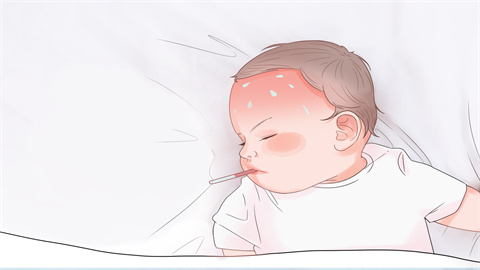What should I do if a child has a persistent fever?
Generally, a child's fever that does not subside could be caused by various factors, including excessive clothing or bedding that hinders heat dissipation, insufficient water intake affecting metabolism, acute upper respiratory tract infection, acute gastroenteritis, and suppurative tonsillitis. It is recommended to seek timely medical attention, identify the underlying cause, and then improve the condition through general treatments, medications, etc., under a doctor's guidance. Detailed explanations are as follows:

1. Excessive clothing and poor heat dissipation: Wearing too many clothes or being covered with overly thick blankets can hinder the body's heat dissipation, causing the body temperature to remain elevated. Reduce clothing promptly, choose loose and breathable cotton garments, maintain good indoor ventilation, and keep the room temperature between 22-26°C to facilitate natural heat dissipation.
2. Insufficient water intake affecting metabolism: Children lose more fluids through sweating during fever, and failure to replenish fluids timely may slow down metabolism and hinder heat dissipation. Give the child small amounts of warm water frequently, or appropriate amounts of mild rice soup or juice to replenish fluids and electrolytes and promote metabolic heat dissipation.
3. Acute upper respiratory tract infection: Often caused by viral infection, the inflammatory stimulation leads to persistent fever elevation, accompanied by symptoms such as nasal congestion and runny nose. When the body temperature exceeds 38.5°C, follow medical advice to use medications such as paracetamol suspension drops, ibuprofen suspension, or pediatric Chai Gui antipyretic granules to reduce fever.
4. Acute gastroenteritis: Caused by bacterial or viral infections due to unclean diet, gastrointestinal inflammation leads to persistent fever, accompanied by symptoms such as diarrhea and vomiting. Follow medical advice to use medications such as montmorillonite powder, Bifidobacterium quadruple live tablets, and oral rehydration salts III to alleviate diarrhea, replenish fluids, and prevent dehydration.
5. Suppurative tonsillitis: Bacterial infection causes pus formation in the tonsils, resulting in a strong inflammatory response that leads to persistent fever, accompanied by symptoms such as sore throat and swollen tonsils. Follow medical advice to use antibiotics such as amoxicillin clavulanate potassium granules, cefixime granules, and pediatric Yankening granules to treat the infection.
In daily care, provide the child with light and easily digestible food, such as porridge and soft noodles, and avoid spicy and greasy foods. Closely monitor temperature changes, measuring every 1-2 hours, and record temperature fluctuations to assist doctors in diagnosis and treatment.




